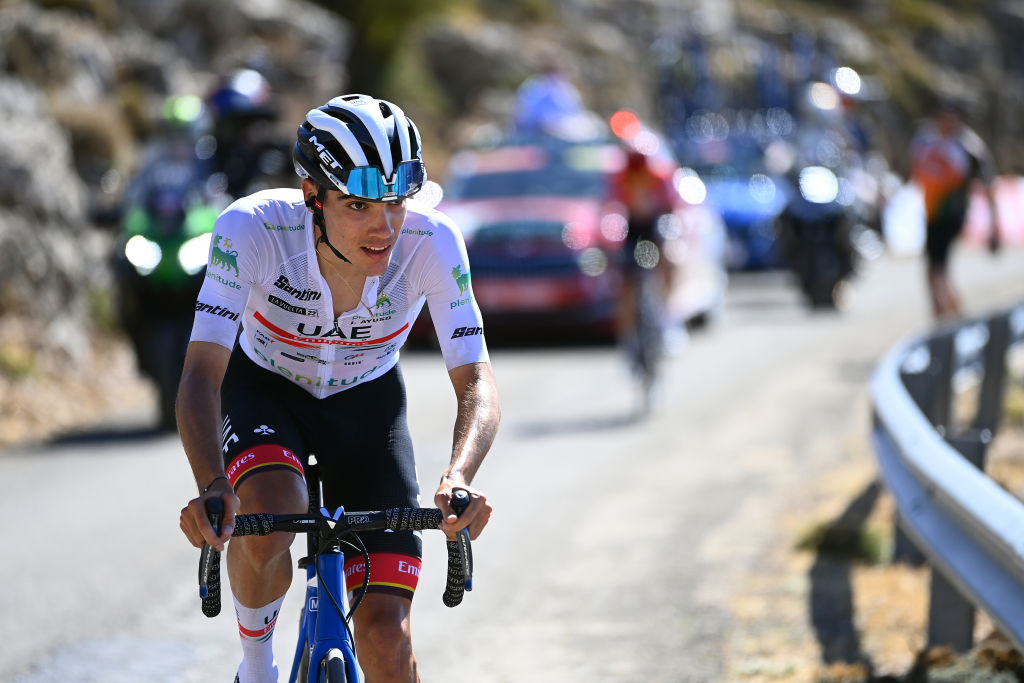Juan Ayuso celebrates becoming second youngest ever to finish on Grand Tour podium
19-year-old second youngest after Henri Cornet won Tour de France in 1904

Despite a very tough start to the Vuelta a Espana, a difficult time trial build-up and even a bout of COVID, 19-year-old Juan Ayuso will reach the final podium of the Vuelta later today as the second youngest top three finisher in a Grand Tour in cycling history.
Ayuso was not even due to race the Vuelta a Espana this year, but after a string of top results, it was decided to bring forward his debut in his home Grand Tour by a full season.
The first-year-pro had a tricky start to the Vuelta, suffering badly on a minor climb in the Basque Country once the race had headed south from its start in Holland.
But after bouncing back on the climbs of northern Spain, he started feeling under the weather just before the main time trial in Alicante. Repeated COVID tests showed he was negative, but later on that week he was diagnosed as having a minor viral load and was allowed to continue the race.
Battling onwards in an already very notable fourth place, Ayuso then moved up to third following Primoz Roglic’s abandon and fought hard to hold onto that provisional podium spot all the way to Madrid.
As a result, he’s now the youngest ever Vuelta podium finisher and after Henri Cornet won the 1904 Tour de France aged 19, the second youngest podium finisher in Grand Tour history.
More and more young riders are staging their breakthroughs in Grand Tours - from teammate Tadej Pogacar winning of the Tour de France at 21, to Egan Bernal taking the same event in 2019 when he was just a few months older. On Sunday evening Ayuso will stand alongside Remco Evenepoel (QuickStep-AlphaVinyl) on the podium in Madrid, who at 22 will be the fourth youngest winner of the Spanish Grand Tour.
Get The Leadout Newsletter
The latest race content, interviews, features, reviews and expert buying guides, direct to your inbox!
“It’s amazing,” Ayuso told reporters on Saturday evening after his third place overall behind Evenepoel and Enric Mas (Movistar) was all but confirmed.
“At the start of the year we didn’t know I was going to race here, it was only decided after the Dauphine.”
“I came here looking for a stage win, although I felt ambitious before the Vuelta and hoped I could get on the podium.”
“But another part of me said I should take things calmly and not worry if I couldn’t get a good result, it was more important to show flashes of brilliance rather than consistency at my age.”
One very encouraging fact, Ayuso said, regarding his future in Grand Tours was that in the third week, he did not start to feel the pace too badly.
Both he and teammate Joao Almeida pushed hard on the Alto del Piornal summit finish on stage 18 and on the last climbing day through the sierras of Madrid on stage 20, Ayuso never seemed to be in trouble either.
“I thought this last week would feel like it was a long one, and actually that was where I felt the best,” Ayuso said. “I suffered a lot in this year’s Vuelta, but having such a good third week was something very important for me.”
At the other end of the spectrum, Ayuso said that the idea of doing even better and beating either Evenepoel or Mas was out of the question.
“To be honest, both Remco and Enric have been superior. I just wanted to manage the bad days and I knew they were stronger. I have to be ambitious, but I also have to be realistic and be proud of what I achieved.”
“I never had to dig so deep mentally as I’ve had to in this Grand Tour to stay ahead, and I think next year it will make me a much better racer.”
However, while he admitted on Saturday that he had been dreaming of the Tour de France since a precociously young age - “since I was seven” - he played down expectations that next season he will be taking part in cycling’s flagship Grand Tour.
“The Vuelta is the biggest race I’ve ever done in my life,” he said before thanking Spanish fans for their “amazing levels of support,” and “for now I’m not thinking about the Tour de France.”
“I’m going to switch off for a while, spend time with my family, and then I will think about next year.” And at 19, Ayuso certainly can afford to spend a while reflecting on what he wants to do next.

Thank you for reading 5 articles this month*
Join now for unlimited access
Enjoy your first month for just $1
*Read 5 free articles per month without a subscription
After your trial you will be billed $7.99 per month, cancel anytime. Or sign up for one year for just $79
Alasdair Fotheringham has been reporting on cycling since 1991. He has covered every Tour de France since 1992 bar one, as well as numerous other bike races of all shapes and sizes, ranging from the Olympic Games in 2008 to the now sadly defunct Subida a Urkiola hill climb in Spain. As well as working for Cyclingnews, he has also written for The Independent, The Guardian, ProCycling, The Express and Reuters.
